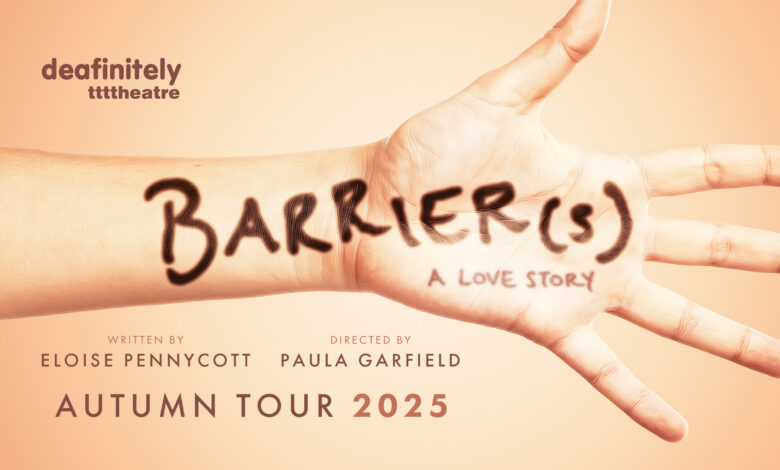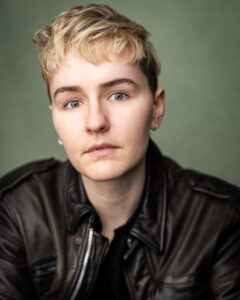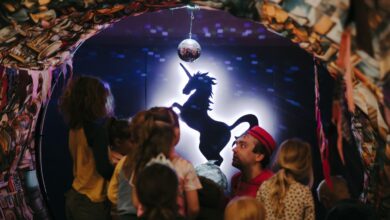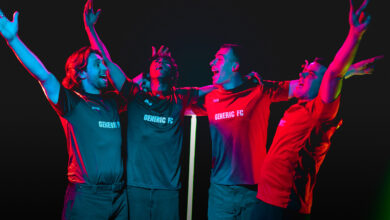Interview: Signs of times changing?

Em Prendergast on Barrier(s) to equality
It’s really exciting to be seeing increasing representation of work by and with d/Deaf people on stage. Recently a production of Deaf Republic at the Royal Court saw a high profile, mainstream show leading with signing over spoken language – a positive shift indeed. Much of the hard work in breaking down barriers has undoubtedly been achieved by pioneering companies such as Deafinitely Theatre. They are the first professional deaf-launched and led theatre company in the UK that works bilingually in British Sign Language and spoken English, and they produce work that caters to audiences of all ages.
Ahead of World Deaf Day on Sunday 28 September, we were delighted to chat with Em Prendergast, who plays Alana in Deafinitely’s latest production of Eloise Pennycott‘s Barrier(s) which is touring to The Rep, Birmingham and HOME, Manchester, before ending its run at Camden People’s Theatre in November.
Hi there Em. Thanks so much for chatting with us today. Firstly, what is Barrier(s) about?
Barrier(s) is written by amazing deaf playwright Eloise Pennycott and is a powerful and intimate love story that explores connection through language and its barriers.
The story follows Alana and Katie. One is hearing, one is deaf, but they have a shared language of Queer liberation and pride. They, like all couples navigate the joys and struggles of love, communication and survival in a world that, much like our own, keeps putting up barriers.
It’s full of warmth, humour and the fight to be understood, and has been critically acclaimed for its honesty and gripping storytelling.
Can you tell us about your character Alana?
Alana is a proud lesbian – they’re fun, full of energy, and they love Katie furiously and unapologetically. At the same time, they’re a hearing person who is ignorant about the Deaf community and the systemic barriers that oppress Deaf and Disabled people. That contradiction is really interesting within the context of the arts: so many people know the ‘right’ language and can confidently talk at length about oppression, but are they actually showing up when people in their own lives are affected? Are they taking real action? Alana really embodies that tension between words and action.
You’re playing alongside Zoë McWhinney. How has that been, and what has your collaboration added to the development of the play?
Zoë is an extraordinary creative force. She’s had such a successful year – co-writing Deaf Republic at the Royal Court, being in the running for the British Deaf Association’s BSL Poet Laureate, and back-to-back working as an extraordinary VV [Visual Vernacular] artist. I learn so much from her. It’s a privilege to be immersed in BSL in a room with them alongside the other Deaf creative legends – Lynn Stewart and Paula Garfield. Our team is full of strong women and non-binary Queer people, sharing stories, laughing, and weaving our lived experiences into the work. When authentic people tell their stories, it radiates through the play. That authenticity enriches the story, and I hope the Deaf Queer community feel they see themselves reflected in it – both the barriers of being Queer, non-binary, Deaf, and the privilege of community and shared understanding that comes with it.
You’ve had considerable experience working across British Sign Language, Sign Supported English and spoken English in your stagecraft. In what ways does this integration of communication techniques help shape accessibility and storytelling on stage?
I first started learning BSL for fun – I wanted to communicate with more people. Later, I needed it because I became Deaf. The irony. That experience was a huge lesson in why disabled access and disabled-led theatre are so vital. Being immersed in the Deaf community, and specifically the Deaf Queer community, changed my life. Without BSL, you can’t begin to grasp the richness of storytelling and deep expression it holds, spoken words simply can’t capture the same feeling or imagery. It’s a privilege to have it as my second language. And if you’re one of those people who says, “I’ve always wanted to learn to sign” today is the day. Learn! And if you’re Deaf, hard of hearing, or didn’t grow up with access to BSL, the community is here for you. It’s never too late. There’s no one ‘right’ way to be Deaf.
You’ve also worked in television, on EastEnders and in Doctors. How does the liveness of theatre compare for you?
I love live theatre. It’s such a privilege to have a creative, silly job, and I never take it for granted. TV jobs have a quick turnaround, so you don’t always get the depth of connection you do in theatre. Sometimes that’s nice, but in theatre you really get to build a team with like-minded people, and often people who are very different from you – that’s the best part. Some people go their whole lives without deep connection, and I get to wake up every day and be in company, seen, understood, and given a platform. That being said, I’d love to do more TV next year – I’m ready for the next lesbian drama, the next generation’s L Word!
Theatre continues to become more accessible, but I have to acknowledge that it is entirely inaccessible still for some Disabled people. TV, with its often bigger budgets and shorter duration, can sometimes provide a more accessible platform for Disabled artists to access. For example, some amazing Disabled led TV has been made in the past few years: Rosie Jones’s Pushers; Kyla Harris’ We Might Regret This and Deaf led Reunion and Code of Silence – just to name a few. So, if there’s anything anyone in a creative position of power takes from this interview, please may it be: Platform Disabled people and their stories. Fund their projects. Ask what they need to be able to thrive in your workplace, and make the adjustments. The time is now.
This is a story about an LGBTQ+ relationship. Does it feel like there’s a real space in theatre at the moment to develop Queer narratives around Deaf relationships and equality?
I feel lucky to live in a time where Queer and Deaf people are increasingly represented on stage and screen, and I think it’s so important that Queer relationships are shown not just through the lens of struggle, but also through pride, fun, and passion. At the same time, I can’t pretend it isn’t a scary time to be Queer and Trans. Our rights are being reversed in front of us. Trans people face real danger and discrimination, and some still feel forced to closet themselves. Straight actors are still being cast in Queer roles. For me, it’s our duty to platform Trans and Queer creatives, and to make space especially for Trans people of colour and Trans-femmes. We all need to work together in the ongoing struggle for equity, not just equality. None of us are free until we are all free. Protect the dolls. Free Palestine. Trans rights now.
Barrier(s) is going to be touring from Birmingham to Manchester and finally London. Are you braced and ready for these diverse locations?
I love Birmingham and I love Manchester. One of my favourite things is going to a new city and finding the local Queer and Deaf scene. If anyone has recommendations, please send them my way on Instagram @emprenempren. Where are the lesbians getting coffee in Manny and Brum? Because I’ll be there.
Thanks very much to Em for talking to us about Barrier(s). Watch this space for ET’s review later in the year.
Barrier(s) begins its tour on Saturday 18 October; full dates below.
18 – 25 October The Rep, Birmingham
6 – 8 November HOME, Manchester
11 – 29 November Camden People’s Theatre






